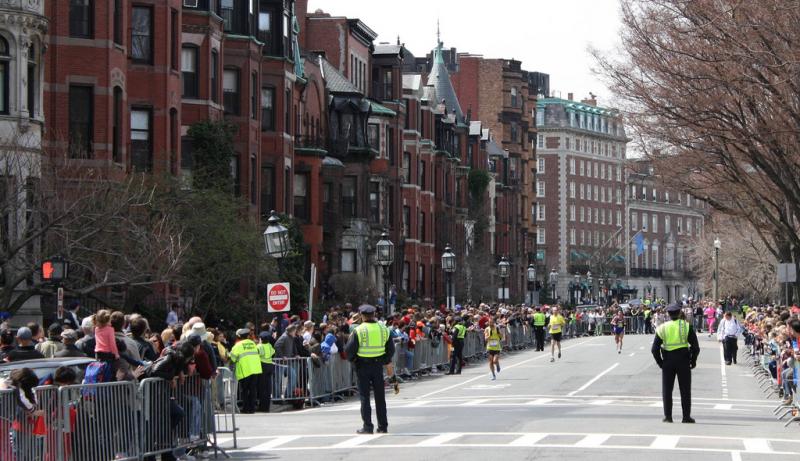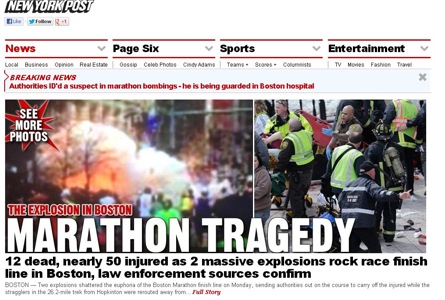Boston Marathon Bombing: Facts And Fiction In Chaos

Among the first news outlets to report the bombing were the New York Post and the Washington Post. As photos, video and conflicting information spread virally from the ground up, many reporters became overwhelmed with confusion. Several sources were discredited throughout the process, as well as different calculations of the number injured. The Washington Post pointed out that the New York Post itself made far too many mistakes during the first reports on the bombing.
The Washington Post noted that the New York Post had multiplied the number of confirmed causalities, and also mistakenly mentioned that a “Saudi national” was being treated for “shrapnel wounds” while being “guarded as a potential suspect” in the investigation. The New York Post's report obviously sparked the interest of multiple news organizations and pitted the Boston Police against the New York Post’s sources. The Atlantic Wire and online publication The Frisky questioned the New York Post's unclear and potentially inaccurate reporting. Atlantic Wire writer Connor Simpson said:
"So the Post is either so far ahead of the story the story or wrong in the worst possible way. The truth likely lies somewhere in the Post's choice of words, as it now seems they may be vindicated in the end. Reports are still foggy right now, but it seems the Post was more right than wrong about everything."

The New York Post is a historically strong publication that has been losing credibility over time, according to Fred Brown, Vice Chair of the Society of Professional Journalists Ethics Committee. He told Neon Tommy via email Wednesday:
"Apparently there was a kernel of truth in the report about a Saudi man being at least questioned, but so far the inflated number of deaths - 12, according to the Post, at a time when the police were reporting 2 deaths (which later became 3) -seems way out of line.
"The New York Post lately has hurt its reputation for sensationalism, specifically with the front page photograph of a man about to be hit by a subway train. So while inaccurate reporting in the Boston Marathon problem may reinforce a diminished level of trust in the NY Post, I don't think it has much effect on journalism generally.
"In fact, I worry that the public's appreciation for good, accurate journalism is in a state of decline; too many would rather be entertained than informed."
Brown also stressed that any incorrect information reported by the New York Post should be publicly removed and updated to reflect the most current information (which it does), and mentioned that all journalists should hold themselves to the highest ethical standards while reporting. Brown said, “the Post should discuss what happened with the staff - not just the staff responsible for this story, but everyone involved in the dissemination of news - to stress the importance of fact-checking.”

However, the need for the New York Post to respond directly to the incident is still in question. It has now been confirmed that a Saudi national was being treated in the hospital. But, reports of the national as the key suspect in the investigation were later denied by the Boston Police Department and the FBI. Yet, the New York Post article did have legitimate content regarding the Boston Marathon Bombings aside from the number of causalities. Therefore, is it worth it to even discuss the publications mishap?
George Daniels, the former chairman of the Society of Professional Journalists Diversity Committee, feels that it is not only too early to discuss one publication's mistake, but also that concern should be relegated to the criticism of journalists who were immersed in the chaos of the Boston Marathon Bombings on the ground trying to report breaking news.
Daniels said via email Tuesday, "Because we have web sites and journalism critics who don't have anything else to report, they will sit around online and pick apart what those on the scene of a breaking story are doing and amplifying mistakes that are made. I don't think that's productive or helps improve the journalism profession." He added, "This is the type of analysis that you do after the dust settles (no pun intended)."
Even though it may be far too early for Americans to have recovered enough from the devastating attack to worry about the ethical practices of journalists, for at least some Americans, the issue is alive in the back of their minds. People around the world watch the news precisely to obtain factual accounts of the day's or week's events, and although entertainment has taken a precedent over other news, a mistake in reporting news of a celebrity is far different than confirming 12 dead in an ongoing breaking news report.
The desire to be the first to report a story doesn't excuse the inability to accurately confirm sources. The passion behind journalists' desire to relate complete and accurate accounts of events, whether crisis situations or otherwise, has and should continue to be what drives journalists' work.
On Wednesday, CNN reported that a suspect had been identified in the Boston Marathon Bombings. Within the hour, the network pulled their statement, but not until the Huffington Post and multiple other news publications, including Yahoo, had already reported the same thing, using CNN as their source.
As we all take time to reflect on Monday's bombings, we can rest assured that mistakes may happen, and those mistakes may be pointed out by outlets like the Washington Post. But we can also rest assured that in the midst of breaking news about an ongoing bomb search, about dismembered bodies, about injured victims and grieving families, the journalists on the ground were doing their best to not only get the story right, but they were also doing their best to help guide those throughout the nation in need of information to process Monday’s horrific bombings.



